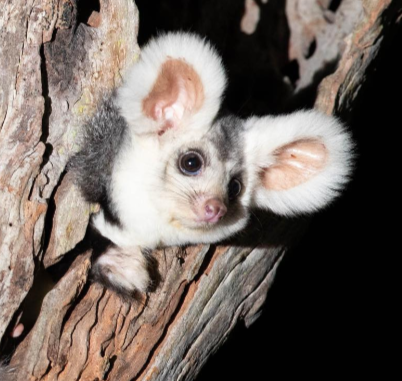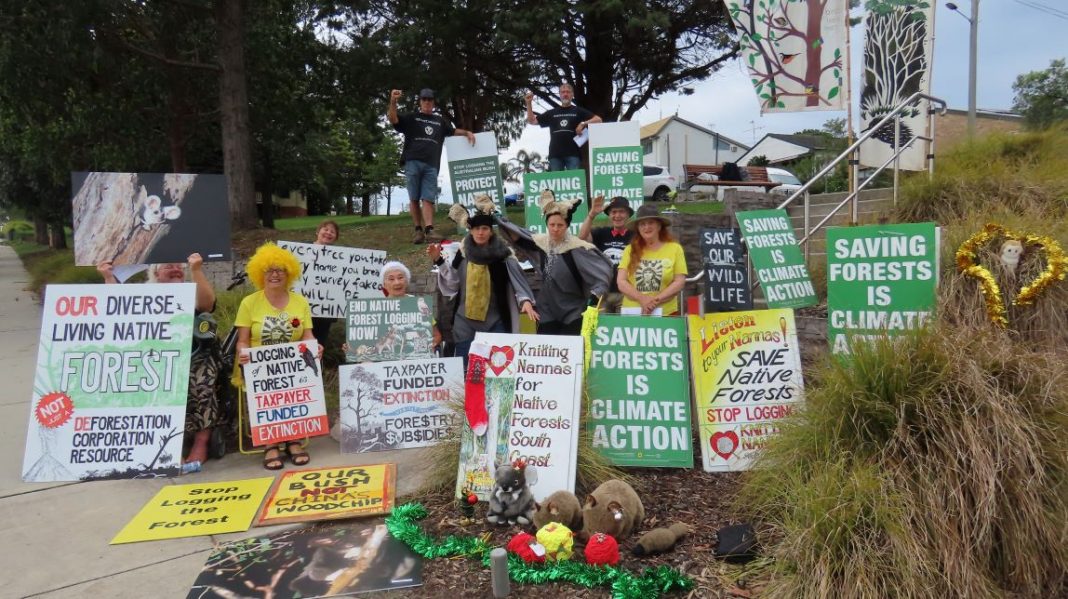Knitting Nannas for Native Forests – South Coast loop held a Knit-In with an alliance of NSW South Coast environmental groups outside the Forestry Corporation office in Batemans Bay on Friday 8 December to urge for greater protection for endangered Greater Gliders.
South Coast and Braidwood locals from Friends of the Forest (Mogo) and Brooman State Forest Conservation Group rallied with Knitting Nannas as the two EPA Stop Work orders in Flat Rock and Tallaganda State Forests both expire by Christmas Eve.
The protestors carolled with purpose, singing forest protection words to favourites like Jingle Bells and Silent Night. According to Knitting Nannas’ Joslyn van der Moolen, “all we want this Christmas is for our forests to be protected for wildlife and carbon storage”.
The groups’ loud and colourful Knit-In featured two Greater Glider costumed performers and an array of closeup photos of Greater Gliders from Tallaganda State Forest that led to the Stop Work Order. This Knit-In was also a ‘Fridays 4 Forests’ action that occurs weekly along the east coast of NSW.
The Flat Rock State Forest Stop Work Order was imposed by the EPA on Tuesday 14 November after the community reported a Greater Glider den tree within 30 metres of active logging. The mandatory exclusion zone around den trees is 50 metres. The Stop Work Order is due to expire on Christmas Eve, prompting widespread concern in community conservation groups that not enough is being done to protect the Greater Gliders over the holiday period.

Unprotected Greater Glider den trees continue to be reported in active logging sites across the state. The Tallaganda State Forest Stop Work Order was imposed on 30 August after only one Greater Glider den tree was marked for protection in over 1500 hectares of active logging. This has since been extended twice after community citizen scientists found numerous Greater Gliders. It is due to expire on 20 December.
Takesa Frank from local Brooman State Forest Conservation Group said “protecting the habitat of Shoalhaven threatened species is crucial for biodiversity”.
“We must take proactive measures to turn around Australia’s leading role in the twin climate crisis and extinction crisis, by ending logging of our NSW public native forests. This will ensure a sustainable and liveable planet for future generations,” she said.
Takesa recently received the Bob Brown Foundation 2023 Young Environmentalist of the Year award for her local advocacy to protect lower Shoalhaven state forests and her 23,000 signature petition to end native forest logging presented to NSW parliament in 2022.
Joslyn, who has lived in Braidwood at ‘Manar’ said, “World Wildlife Australia and Wilderness Australia are calling for the Tallaganda State Forest Greater Glider hubs to be added to Tallaganda National Park. This is to protect one of the few remaining large populations of Greater Gliders unaffected by the Black Summer fires”.
“A new development is Forestry now responding to community surveying rather than waiting for the EPA to impose regulatory action. In Styx River State Forest, north east of Armidale, FCNSW suspended logging after a tree-sit drew attention to citizen scientists surveying who found 24 Greater Gliders and three Greater Glider den trees that had not been allocated 50m exclusion zones,” Joslyn said.
“It’s truly pathetic and appalling that a heavily subsidised corporation is playing catchup with volunteer citizen scientists. This is despite the work of many regulatory bodies including the NSW EPA, the Natural Resources Commission, and NSW and Commonwealth departments responsible for forestry and the environment. Without leadership from the NSW and Commonwealth governments, thousands of well meaning public servants are being brought to heel by local heroes sacrificing their personal lives to protect wildlife in their local forests.
“This failure to protect wildlife is amplified by the huge areas of public native forest in NSW subject to logging. FCNSW arranges logging by private contractors within 780,000 hectares of public forest out of the 2 million hectares they manage. The logging industry must wake up, and proactively get moving to focus 100 per cent on the job-rich softwood plantation sector that already supplies the construction sector most Australian timber needs for housing,” Joslyn said.



